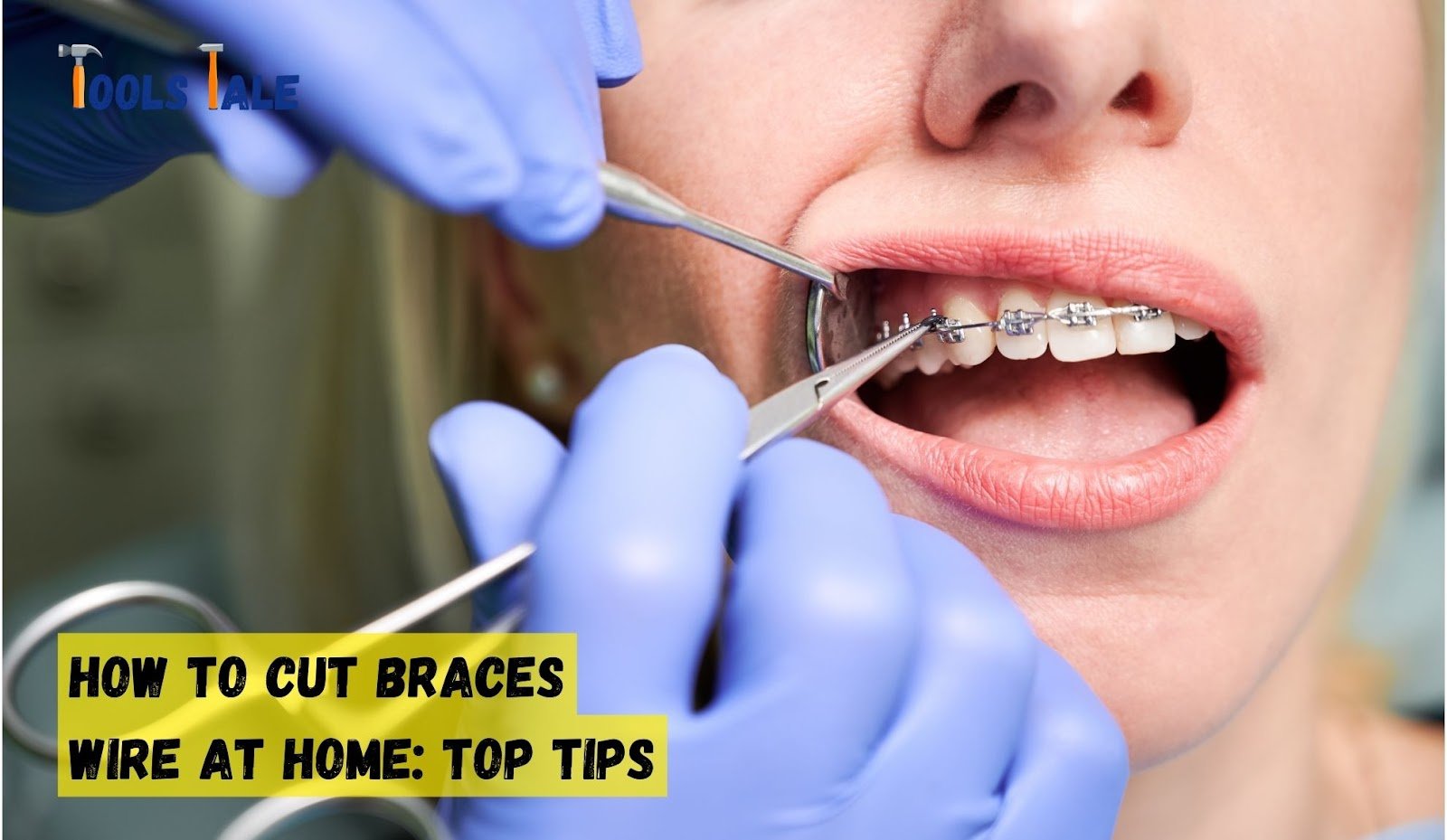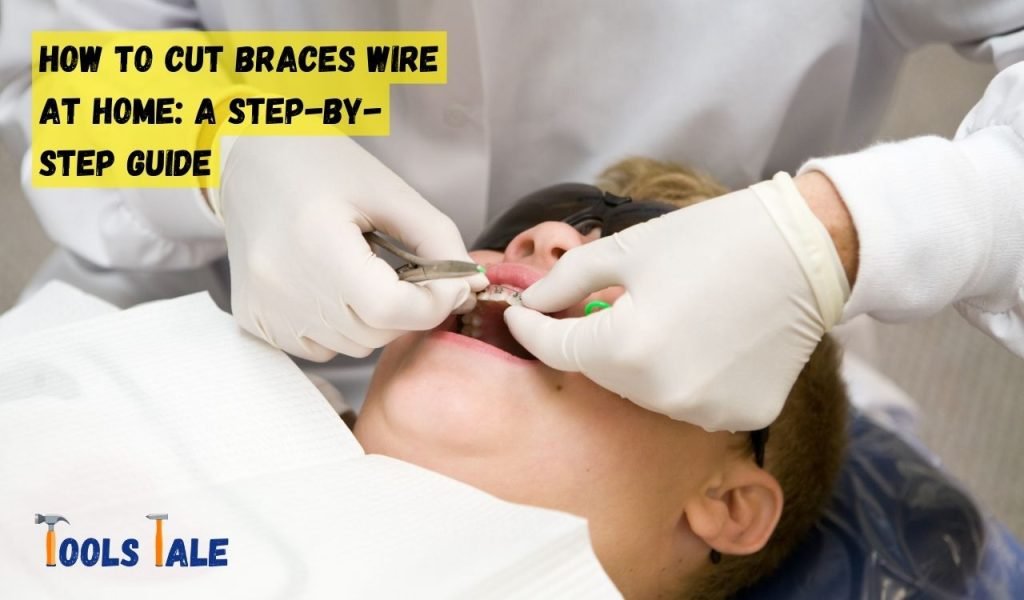Physical Address
304 North Cardinal St.
Dorchester Center, MA 02124
Physical Address
304 North Cardinal St.
Dorchester Center, MA 02124

Want to master the art of DIY orthodontics? Wondering how to cut braces wire at home like a pro? You’ve come to the right place! Cutting braces wire at home can be a game-changer for minor adjustments, providing comfort and relief.
In this guide, we’ll show you the ropes, equip you with the right tools, and share top tips for a successful experience. Get ready to take control of your orthodontic journey and achieve that perfect smile with confidence. Let’s dive in!
Key Summary: How to Cut Braces Wire at Home?
Trimming braces wire at home can be done with care. First, gather clean, fine-cut pliers. Use orthodontic wax to prevent irritation. Get a dental floss threader and a small pair of wire cutters. Remember, professional assistance is best, but if necessary, take your time and proceed cautiously.
The braces wire, also known as the archwire, is a vital component of your orthodontic journey. It plays a pivotal role in aligning your teeth and correcting your bite. Running through the brackets attached to your teeth, the braces wire applies gentle pressure to guide your teeth into their desired positions over time.
Each adjustment of the braces wire helps maintain progress and ensures that your teeth move effectively. While major adjustments are best left to your orthodontist, minor tweaks can be made at home. However, it’s essential to exercise caution and follow the proper techniques to avoid any complications.
In the following sections, we will take you through the step-by-step process of cutting braces wire at home, along with the necessary tools you’ll need and some crucial safety tips. Let’s dive into the details and equip you with the knowledge to master the art of cutting braces wire at home safely and effectively.

Cutting braces wire at home can be a daunting task, but with the right approach and technique, you can achieve accurate results safely. Follow this step-by-step guide to ensure precision when cutting your braces wire:
Before you begin, gather the essential tools required for this DIY procedure. You will need:
Create a clean and well-lit workspace for the procedure. Lay down a cloth or towel to catch any small pieces of wire that may fall during the cutting process. Sanitize your hands and the tools you’ll be using to maintain proper hygiene.
Carefully examine your braces and identify the portion of the wire that needs to be cut. Use the tweezers to gently hold the wire in place, ensuring better control during the cutting process.
Position the orthodontic wire cutter close to the area you intend to cut. Ensure the blades of the cutter are properly aligned with the braces wire to achieve a clean and precise cut.
With steady hands, gently squeeze the wire cutter to cut through the braces wire. Take your time and avoid applying too much pressure, as it may lead to an uneven cut. Ensure that the cut is clean and without any jagged edges.
After cutting the wire, inspect the cut end for any sharp edges that might irritate your mouth or cheeks. If needed, use a nail file to smoothen the edges carefully, ensuring maximum comfort.
Once you have cut the braces wire, gently move your mouth and check for any discomfort caused by the cut end. If you experience any irritation, revisit Step 6 and smoothen the edges further.
It’s important to remember that while DIY braces wire cutting can be helpful for minor adjustments, major changes or issues should always be addressed by your orthodontist. Follow your orthodontist’s recommendations and avoid attempting complex adjustments on your own.
After completing the DIY braces wire cutting, make sure to maintain good oral hygiene. Brush and floss regularly to prevent any debris from accumulating around the cut wire
Before you embark on cutting braces wire at home, it’s crucial to ensure you have all the necessary tools. The right tools not only facilitate a smooth process but also ensure safety and accuracy. In this quick checklist, you’ll find the essential tools you’ll need for DIY braces wire cutting:
The orthodontic wire cutter is a specialized tool designed specifically for cutting braces wire. It features fine blades that allow for precise cuts without damaging the braces or your teeth. Using this tool ensures that you can make clean and accurate cuts, which is essential for proper adjustments.
Wearing latex gloves is a fundamental safety measure when handling braces wire and tools. These gloves protect your hands from any sharp edges that may be present on the wire or the wire cutter. Additionally, they minimize the risk of contamination, maintaining a hygienic environment during the DIY cutting process.
Tweezers play a crucial role in holding and manipulating the braces wire during the cutting process. They provide better control, allowing you to position the wire correctly and ensure precision while making the cut. Having a reliable pair of tweezers is essential for a successful DIY braces wire cutting experience.
By having these essential tools readily available, you’ll be well-equipped to handle the DIY braces wire cutting process with confidence. Remember that precision and safety are paramount when working with braces wire, and using the right tools will help you achieve accurate results while minimizing the risk of mishaps.

careful planning and attention to detail. Here are the top tips to help you achieve accurate results and a safe DIY cutting process:
Before attempting any adjustments at home, it’s crucial to consult your orthodontist or dental professional. They have the expertise and experience to assess your specific orthodontic needs and provide valuable advice. Professional guidance will help you determine if DIY braces wire cutting is suitable for your situation and ensure you’re well-prepared for the process.
Precision is key when cutting braces wire. Take your time and proceed with caution to avoid mistakes that could lead to discomfort or damage to your braces. Rushing through the process may result in uneven cuts or jagged edges, which can be uncomfortable in your mouth.
While DIY braces wire cutting can be beneficial for minor adjustments, it’s essential to have a backup plan in case you encounter difficulties or uncertainties during the process. Consider having someone who can assist you or be prepared to visit your orthodontist for professional adjustments if needed.
Always wear latex gloves when handling braces wire and tools. Latex gloves protect your hands from any sharp edges and minimize the risk of contamination during the cutting process. If you experience any pain or discomfort while cutting, stop immediately and consult your orthodontist.
Reserve DIY cutting for minor tweaks and adjustments. Major changes or complex issues should always be addressed by your orthodontist to ensure the best possible outcome. DIY braces wire cutting is suitable for small corrections, but extensive modifications require professional expertise.
After completing the DIY braces wire cutting, it’s essential to maintain good oral hygiene. Brush and floss regularly to prevent any debris from accumulating around the cut wire, promoting oral health during your orthodontic treatment.
Educate yourself about the DIY cutting process and understand its limitations. Read reliable resources, watch informative videos, and follow expert guidelines to ensure you’re well-informed and confident before attempting the procedure.
A successful DIY braces wire cutting experience relies on precise measurements and accurate cuts. Use proper tools like an orthodontic wire cutter, and follow the step-by-step guide to achieve the desired results.
While DIY braces wire cutting is generally safe for minor adjustments, it’s essential to be prepared for unexpected situations. Keep your orthodontist’s contact information handy in case you need immediate professional assistance.
When attempting to cut braces wire at home, safety should be your top priority. Following these safety tips and precautions will help you cut braces wire with confidence and minimize the risk of accidents or damage:
By adhering to these safety tips and precautions, you can cut braces wire with confidence and achieve precise and comfortable results. Remember that DIY cutting should be approached with caution, and seeking professional assistance when needed will ensure the best outcome for your orthodontic treatment. Your safety and oral health should always come first.
In conclusion, learning how to cut braces wire at home can empower you to make minor adjustments, find relief from discomfort, and gain a deeper understanding of your orthodontic journey. While DIY cutting can be beneficial for some situations, always prioritize safety and seek professional guidance for significant changes.
With the right tools, knowledge, and caution, you can confidently navigate DIY orthodontics and achieve the smile you’ve always wanted. Remember, your orthodontist remains your best ally in achieving a successful and effective orthodontic treatment. Embrace the journey, stay informed, and embrace the newfound control you have over your braces wire cutting experience.
To safely remove braces wire at home, it’s recommended to use orthodontic wax to cover any poking or irritating ends. If the wire is causing discomfort, contact your orthodontist for guidance.
Cutting braces wire at home is not recommended due to potential risks. Orthodontic tools, like special wire cutters, are used by professionals to ensure safe and precise cutting.
Using regular scissors to cut braces wire is not safe. Orthodontic wire requires specialized tools for accurate and controlled cutting without causing harm to your teeth or gums.
Attempting to cut braces wire at home can be dangerous and lead to injury. Orthodontic treatment should always be managed by a professional to avoid complications.
It’s strongly advised not to cut braces wire at home. If you experience discomfort or a protruding wire, reach out to your orthodontist for guidance on how to address the issue safely.
The best way to cut a braces wire is to not attempt it at home. Seek assistance from your orthodontist to ensure the wire is trimmed properly and without causing harm.